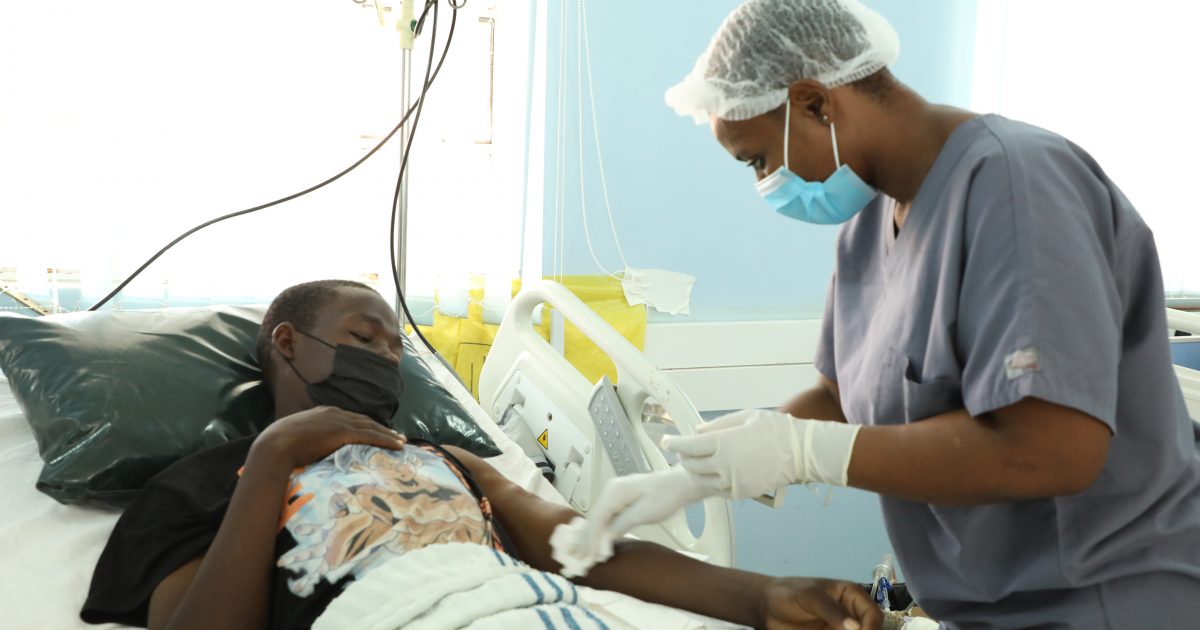At 25, he has mastered the craft of putting on a jovial façade for the sake of anyone watching him. However, the small smile hovering on Alfred Matata’s lips does not entirely conceal the misery lurking deep in his eyes. Under this veneer of normalcy boils a cauldron of anguish and mental turmoil that is gradually pushing him to the verge of great despair.
“I don’t want to think about my future; not now. I am sorely focusing on my condition. I trust I will make it,” he says softly.
His words ooze with confidence. A moment later, he surreptitiously dabs his eyes with a worn handkerchief. A long and uneasy silence ensues. Emotions under control, he looks up with a lopsided smile.
“Sorry about that,” he mumbles.
Matata suffers from severe Chronic Kidney Disease (CKD). When first diagnosed, the disease had him admitted in hospital as doctors fought to expel the life-threatening toxins that had accumulated in his blood.
It started in May 2021. He woke up one morning with a puffy face and aches on his back. He attributed his discomfort to the backbreaking labor he subjected his body to while working on their family farm at Kimala village in Taveta sub-county.
Having dropped out in class eight, Matata knew he had to rely on the strength of his arms to escape the crippling poverty his family lived in. He immersed himself in farm work. Still, the swelling bothered him. He was at first misdiagnosed at a local dispensary before another visit to a different facility established the issues with his kidneys.

“The medic at the second dispensary said I needed to have my kidneys checked based on how I appeared,” he recalls.
The laboratory results at Taveta sub-county hospital confirmed his nightmares. There were excessive toxins in his blood.
That was the beginning of his new life as a youth who must depend on machines to stay alive. He was briefly admitted in Taveta hospital before his transfer to Moi County Referral Hospital (MCRH) to start his dialysis sessions in the renal unit at the facility.
Matata has two dialysis sessions per week. Located 110-km away from Taveta, MCRH would cost his struggling family two thousand shillings on a weekly basis for fare alone. That hassle of long distance travelling using public means was further subjecting his frail body to more strain.
His desperate parents started paying another patient who was going to the facility for dialysis sessions the money to have their son ride in a personal car. Still, the financial burden remained too high.
When the burden became unbearable, Matata made a decision. Weak as he was, he knew he was a man. He had to stop impoverishing his parents further. He moved with a few personal belongings from his home in Taveta to the outskirts of Voi from where he could get easier access to the dialysis unit. Though the distance is not as near, he prefers to walk rather than pay Sh100 for bodaboda fare.
“I come very early before the sun is too hot because of my blood pressure,” he says.
Matata moved to Voi in August last year. Since then, he has not been home to see his parents and siblings.
“I have not seen any of them for six months but they call. Whatever little money I get is to pay rent and buy the special diet as ordered by the doctor. I hope they understand my situation,” he mumbles but the nostalgic note in his voice betrays the profound homesickness he has.
Matata’s reunion with his family might soon be fulfilled. The Department of Health Services in Taita-Taveta County is on the last phase of establishing the second state-of-the-art renal unit in Taveta sub-county to effectively serve renal patients from the remote border region.
“Of course I am excited! Who wouldn’t? It will help us save and patients from Taveta will be treated closer to our homes,” he says.
Dr. Timothy Mlamba, the Medical Superintendent of Taveta sub-county Hospital, discloses the Taveta renal unit is at 95 percent complete. The contractor is expected to finish the work shortly.
The medic said the unit has two dialysis machines, beds and a water plant. The water plant can serve up to five dialysis machines. The county has also deployed two renal nurses in readiness for commissioning of the unit.
“We have the equipment and the staff needed to start dialysis sessions. The contractor is finalizing on last-minute touches on the room,” he said.
Dr Mlamba added that all kidney patients in Taveta had to be referred to Moi County Referral Hospital putting a heavy strain on both finances and family ties.
“The dialysis trips to Voi are too expensive for poor patients. Patients opt to rent houses and are separated from their families. With this unit up, the expenses for patients will be reduced and those who have shifted will come back to be reunited with their loved ones,” he said.
The hospital has also received a biochemist machine and an electrolyte analyzer for early diagnosis of kidney diseases. Once operational, there are indicators that the unit will also serve kidney patients from the neighboring Kajiado and Rombo regions that do not have renal units.
Currently, there are 40 patients using the eight-dialysis machines at the renal unit at Moi County Referral Hospital. The unit operates on weekdays and on Saturdays to serve the high number of kidney patients. Dozens of others are on the waiting list signaling the high number of kidney ailments in the region.
Dr Heribarto Roda, the county nephrologist, says that most CKD patients only seek treatment when the disease is at advanced stages. He attributes this to lack of manifest symptoms when the disease is at stage one and two.
“Most patients come when the disease is at stage 3 or 4. There is a need for public awareness to encourage people to go for tests early enough,” he said.
County Executive Committee Member (CECM) for Health John Mwakima says the county is focusing on having an adequate number of staff placed at the renal unit to deliver quality services to the patients.
“We see this as a health hallmark to serve renal patients in Taveta. We will have saved them the inconveniencies of travelling far to seek medical help,” he said.
By Wagema Mwangi




